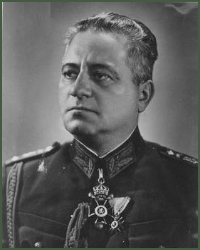Branislav Katalenić: Difference between revisions
No edit summary |
No edit summary |
||
| Line 39: | Line 39: | ||
==Honors and Awards== | ==Honors and Awards== | ||
[[Category:Syara]] | [[Category:Republic of Syara]] | ||
Latest revision as of 21:20, 1 December 2021
Branislav Katalenić | |
|---|---|
 Katalenić in 1933 | |
| Born | 27 August 1879 Hrerodok, Syara |
| Died | 1 May 1950 (aged 70) Gniela, Syara |
| Allegiance | |
| Service/ | Army of the Syaran Republic |
| Years of service | 1911–1939 |
| Rank | Colonel General |
| Battles/wars | Divide War Siduri War |
| Awards | see below |
Branislav Katalenić was a Syaran general who served in the Army of the Syaran Republic from 1911 to 1939, during which he fought in both the Divide War and the Siduri War. He was most noted for his role as overseer of the Syaran occupation of Ruvelka from 1934 until it's liberation by the Common Axis in 1938.
An ethnic Scitarian, Katalenić served as a battalion commander and later brigade commander during the Desopya Campaign. In 1934 he commanded the Syaran Fifth Army during the invasion of Ruvelka, after which he was promoted to the rank of Colonel General and given command of the Syaran forces occupying Ruvelka. He spent much of this time fighting against the Ruvelkan Resistance. Although he issued a number of orders and decrees to limit the amount of damage done by the Syaran occupation, Syaran troops under his command committed a number of acts of violence including murder, rape, and destruction of property. An estimated 100,000 Ruvelkans were killed by his troops during the occupation. Following the collapse of Syaran strategy in the war, Katalenić was given the task of defending Syaran control of Ruvelka from the Common Axis during the Liberation of Ruvelka. He refused orders to enact a "scorched earth" policy by his superiors, arguing that it would only do more harm than good. He retired from military service shortly after the war ended and died in 1950.
Katalenić's reputation and legacy have been a matter of debate. While he generally tried to limit the excessive violence committed by his troops in Ruvelka, he was often lax in punishing offenders and his actions in fighting the Ruvelkan resistance on more than one occasion saw Ruvelkan civilians killed in retribution. His performance was mixed in many regards; he is considered to have pioneered many of the concepts that would later form the bedrock of counter-insurgency operations, but he failed to effectively destroy the Ruvelkan resistance movement, and also failed to capture Kata Kovács after the fall of Aszod.